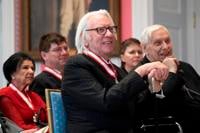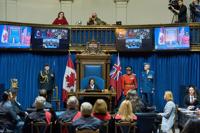OTTAWA - The Senate ethics watchdog has found Conservative Sen. Michael MacDonald violated the code of conduct with a colourful rant during the "Freedom Convoy" protest last year, and a refusal to comply with an investigation into his actions.
The Nova Scotia senator was caught on video in February 2022 castigating downtown Ottawa residents who complained about the weeks-long demonstrations against COVID-19 pandemic-related restrictions and the Liberal government.
In the video, MacDonald described the residents as overpaid and underworked.
"It's everybody's f---ing city, this is the capital of the country. It's not your goddamned city just because you have a six-figure salary and you work 20 hours a week. You haven't worked a full week in two years. It's sickening," MacDonald says in the recording.
In the video, MacDonald refers to his wife as "a Karen" — a derogatory term for a self-entitled woman — for opposing the protests. Despite police ordering protesters to clear the scene, MacDonald adds that "I don't want them to leave."
MacDonald apologized for his remarks in the Senate last February. He told media and Senate ethics officer Pierre Legault he had been drinking that evening. In the recording, MacDonald is heard asking that he not be recorded, and the videographer falsely claims he is not on tape.
The watchdog has ruled MacDonald breached six sections of the code that governs senators, leaving a "significant impact" on the institution.
"Senators are expected to represent Canadians, not denigrate, mock and demean them, while encouraging illegal activities at a time when a state of emergency had been declared," Legault wrote in a report released Tuesday.
He said the senator's request to not be filmed showed "an intentional failure to exercise dignified reserve and restraint."
Legault has ruled that MacDonald's comments broke rules that senators "uphold the highest standards of dignity inherent to the position of Senator" and "refrain from acting in a way that could reflect adversely on the position of Senator or the institution of the Senate."
The investigation began when nine of MacDonald's peers submitted complaints. The senator acknowledged that he'd fallen short, welcoming Legault‘s guidance on how to rectify the situation.
The watchdog asked MacDonald to undertake three actions, two of which he followed: an apology in the chamber that would also be posted on social media.
The third proposed action was to have MacDonald note to his colleagues that his conduct could merit a censure, which is a formal expression of the Senate's disapproval of something.
The report quotes MacDonald as rejecting that measure, writing that "there was nothing significant about '(his) conduct,'" as he did not break any laws, act aggressively or misuse Senate resources. "This is definitely not an ethical issue," MacDonald is quoted as having written.
His lawyer claimed that the request violated the special rights held by senators and MPs, known as parliamentary privilege, as well as the independence of the Senate. In a letter to the ethics office, the lawyer called it "an insidiously coercive example of compelled speech."
Legault, MacDonald and his lawyer exchanged a series of letters for more than a year, with the senator rejecting to answer a list of detailed questions he deemed to be irrelevant and matters of "partisan debate" that raised "highly controversial public policy matters."
The senator was particularly upset at the watchdog asking whom he had dined with before he made his comments. Legault said that information may have been relevant to determining who had witnessed the exchange with the person who filmed the remarks, and whether the senator was conducting parliamentary duties at the time.
MacDonald eventually sought to have a Senate committee take up the issue, which the office said would undermine the investigation process, which is supposed to be kept confidential and free of political interference.
"His lack of co-operation was a flagrant disregard for the process outlined under the code and that has been duly adopted by the Senate, Legault wrote.
He said MacDonald should have shown "true remorse" for his comments by telling his peers they could issue a censure.
Legault found MacDonald further undermined the code's requirement to act "with dignity, honour and integrity" while undertaking parliamentary duties, because of his repeated refusal to comply with the investigation. For that reason, the officer is now recommending "sanctions of penalties by the Senate" against MacDonald.
"His conduct in this respect was so egregious that there are no measures that would remedy the harm that his actions have caused to the office of senator and the institution of the Senate," the ethics officer wrote.
"This is the first time a senator has not only refused to respect and comply with the inquiry process under the Code but has also argued for and attempted to follow a process that he himself has designed for his own inquiry."
The Senate's conflict-of-interest committee will receive the report and may arrange hearings on the matter, although the Senate is adjourned until Sept. 19.
In an email sent Tuesday, MacDonald said he would discuss the report with that committee. "Out of respect for the process, I won't be commenting further at this time."
MacDonald has been a senator since he was appointed on the advice of former prime minister Stephen Harper in 2009.
This report by Ïã¸ÛÁùºÏ²Ê¹ÒÅÆ×ÊÁÏ was first published July 18, 2023.








































